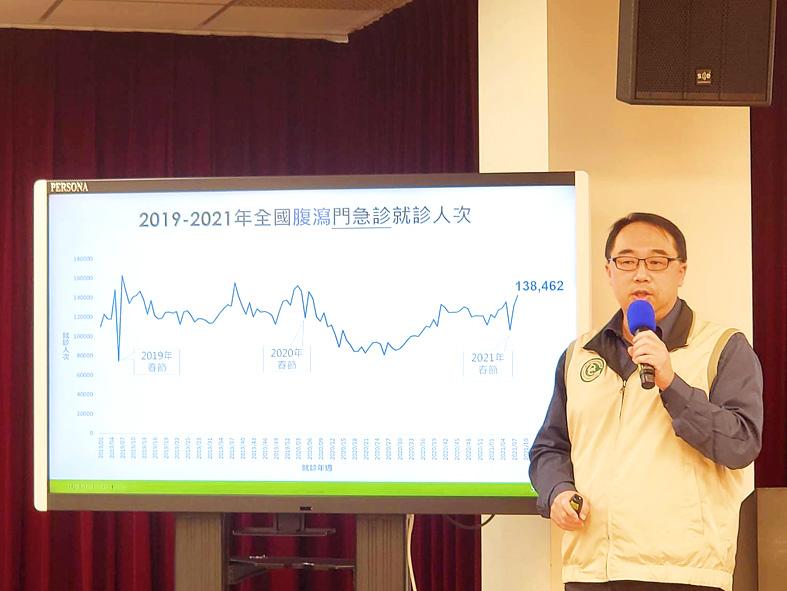People were urged to wash their hands more frequently after the Centers for Disease Control (CDC) yesterday reported an increase in the number of cases of diarrhea over the past two weeks.
CDC Epidemic Intelligence Center Director Guo Hung-wei (郭宏偉) told a news conference that 138,462 cases of diarrhea were reported last week, adding that 87 clusters of diarrhea cases have been reported nationwide in the past four weeks, with 86 percent of the clusters containing 10 or fewer cases.
Fifty-eight of the clusters tested positive for pathogens, with norovirus accounting for 97 percent of the cases, he said, adding that 71 percent of cases had occurred at restaurants and hotels.

Photo: Lin Hui-chin, Taipei Times
People often get together and enjoy meals with family and friends during the Lunar New Year holiday, so diarrhea cases often increase after the holiday, CDC physician Lin Yung-ching (林詠青) said.
The increase has been slightly lower this year, which could be because people are practicing personal disease prevention measures due to the global COVID-19 pandemic, he said.
Norovirus is highly contagious, and it can spread by people eating or drinking contaminated food and beverages, touching contaminated surfaces, putting unwashed hands in the mouth or eyes, or inhaling tiny particles of fecal matter or vomit from an infected person, he added.
Common symptoms are diarrhea and vomiting in the first three days after infection, while other symptoms such as nausea, headache, abdominal cramps and stomach and muscle pain can continue for up to 10 days, Lin said, adding that an infected person could still transmit the norovirus 48 hours after the diarrhea has ceased.
Norovirus is a non-enveloped virus, which is moderately resistant to alcohol-based disinfectants, so washing the hands thoroughly with soap and water is the most effective way of preventing infection, he said.
Lin suggested using diluted household bleach (20ml of bleach to 1,000ml of water) to disinfect toilets, door handles and other surfaces that might have been contaminated by an infected person, as well as washing and changing an infected person’s clothes and bed sheets.
The CDC advises people to wash their hands with soap and water more often, eat thoroughly cooked food and use serving utensils when sharing a meal, Lin said.
People suffering symptoms should stay at home and rest, or seek medical attention if they feel very ill, he said, adding that they should only return to work at least 48 hours after the symptoms have gone, especially workers who deal with food.

Taiwan is to have nine extended holidays next year, led by a nine-day Lunar New Year break, the Cabinet announced yesterday. The nine-day Lunar New Year holiday next year matches the length of this year’s holiday, which featured six extended holidays. The increase in extended holidays is due to the Act on the Implementation of Commemorative and Festival Holidays (紀念日及節日實施條例), which was passed early last month with support from the opposition Chinese Nationalist Party (KMT) and Taiwan People’s Party. Under the new act, the day before Lunar New Year’s Eve is also a national holiday, and Labor Day would no longer be limited

COMMITMENTS: The company had a relatively low renewable ratio at 56 percent and did not have any goal to achieve 100 percent renewable energy, the report said Pegatron Corp ranked the lowest among five major final assembly suppliers in progressing toward Apple Inc’s commitment to be 100 percent carbon neutral by 2030, a Greenpeace East Asia report said yesterday. While Apple has set the goal of using 100 percent renewable energy across its entire business, supply chain and product lifecycle by 2030, carbon emissions from electronics manufacturing are rising globally due to increased energy consumption, it said. Given that carbon emissions from its supply chain accounted for more than half of its total emissions last year, Greenpeace East Asia evaluated the green transition performance of Apple’s five largest final

Taiwan is to extend its visa-waiver program for Philippine passport holders for another year, starting on Aug. 1, Minister of Foreign Affairs Lin Chia-lung (林佳龍) said on Friday. Lin made the announcement during a reception in Taipei marking the 127th anniversary of Philippine independence and the 50th anniversary of the establishment of the Manila Economic and Cultural Office (MECO) in Taiwan, the Ministry of Foreign Affairs said. The decision reflected Taiwan’s commitment to deepening exchanges with the Philippines, the statement cited Lin as saying, adding that it was a key partner under the New Southbound Policy launched in 2016. Lin also expressed hope

Temperatures in New Taipei City’s Sindian District (新店) climbed past 37°C yesterday, as the Central Weather Administration (CWA) issued heat alerts for 16 municipalities, warning the public of intense heat expected across Taiwan. The hottest location in Taiwan was in Sindian, where the mercury reached 37.5°C at about 2pm, according to CWA data. Taipei’s Shilin District (士林) recorded a temperature of 37.4°C at noon, Taitung County’s Jinfeng Township (金峰) at 12:50 pm logged a temperature of 37.4°C and Miaoli County’s Toufen Township (頭份) reached 36.7°C at 11:40am, the CWA said. The weather agency yesterday issued a yellow level information notice for Taipei, New